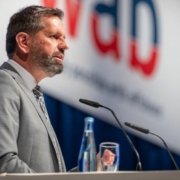Do not outsource the energy transition, German companies plead
German offshore wind companies risk losing out to competitors outside the country unless the government acts, delegates at the 16th Windforce Conference heard.
More job losses are likely in the German wind energy supply chain unless the government changes the course of proposed legislation, delegates at the conference were told.
Speakers highlighted the ‘gap’ in offshore construction activity in the North Sea and Baltic that has already hurt German companies as the source of the problem.
In the longer term, the German Government wants to build a lot more offshore wind, but the short-term scenario could see the industry shrink unless action is taken.
Little construction activity is planned in the near-term despite grid connection capacity being available for projects that are ready for construction. A special tender that could bridge the gap between now and projects later in the decade has been promised – but not yet delivered – by the federal government.
Delegates also heard more criticism of the federal government’s proposed tender model for offshore wind from 2021 onwards.
Bremen senator for economics, labour and Europe Kristina Vogt told delegates that short-term measures in the form of a ‘special tender’ that would bridge the gap are essential. “We need to maintain the skills to ensure we have the necessary capacity for the future.” Her call for a special tender that the coalition government indicated could be forthcoming was echoed by Lower Saxony environment and energy minister Olaf Lies.
WAB managing director Heike Winkler told delegates the German offshore wind supply chain “is threatened” by what she called “wrong political decisions.”
She said without the special tender the government said it would support that has yet to be agreed, more German companies would face financial problems.
She called on the federal government to “stabilise the supply chain” with “immediate measures” of the type that have been promised by the government. Doing so would ensure that once activity picks up after the gap, Germany would not have to rely on imports from other countries to build the offshore wind capacity the federal government has committed to and the green hydrogen capacity that could be created by building large-scale offshore wind projects.
As OWJ has highlighted several times, WAB and many other industry bodies are keen that the federal government adopt a contract for difference (CfD) auction regime of the type favoured by a growing number of governments.
WindEurope chief executive Giles Dickson told the conference, “Growing international markets for offshore wind offer huge technology leadership and export potential for German companies.
“But there is competition from other European countries which are pioneers in offshore wind such as Denmark and the UK and from countries which are now eager to expand offshore wind and their supply chain such as Poland, France and Spain.
“Jobs and investment volumes depend on getting the regulatory framework for offshore wind right. To keep attracting investors Germany must introduce CfDs, the most popular and most reliable model for refinancing offshore wind energy projects.”
The German Government has proposed an amendment to the German offshore wind bill (WindSeeG) that would allow for negative biding in the case of multiple zero-bids. A broad alliance of companies, politicians and associations has urged it to review the plans and to introduce CfDs instead. The Bundesrat, Germany’s second chamber, recently rejected the federal government’s plan and recommended implementing CfDs. A final decision in the German parliament is yet to be taken.
wind:research managing director Dirk Briese said German value creation in the offshore wind sector has shrunk in recent years and could fall further. But with the right action from the federal government, he told delegates, “There is an opportunity to save tens of thousands of jobs and create thousands more.
“The wind energy market is one of the few growth markets in the world with an average growth rate of well over 20% in the next decade,” he said.
Mr Briese presented a number of different scenarios to illustrate the effect of political decisions on employment. He reminded the audience of the rapid growth of offshore and onshore wind in Germany. In terms of average annual growth rates, offshore (29%/year) and onshore (19%/year) wind outperformed most other industries in the past decade, but more recently the growth of the industry slowed down as the rate of installation of wind turbines has fallen. Insolvencies and a reduction in total German offshore wind jobs were the results.
Panellists agreed that offshore wind installations offered great potential for employment along the whole value chain. As Germany plans to increase its offshore wind capacity to 20 GW by 2030 and 40 GW by 2040, the panellists painted an optimistic picture for the future of the sector – and for German companies – if action is taken in the short-term.
Source: https://www.rivieramm.com/news-content-hub/donrsquot-outsource-the-energy-transition-german-companies-plead-60849




